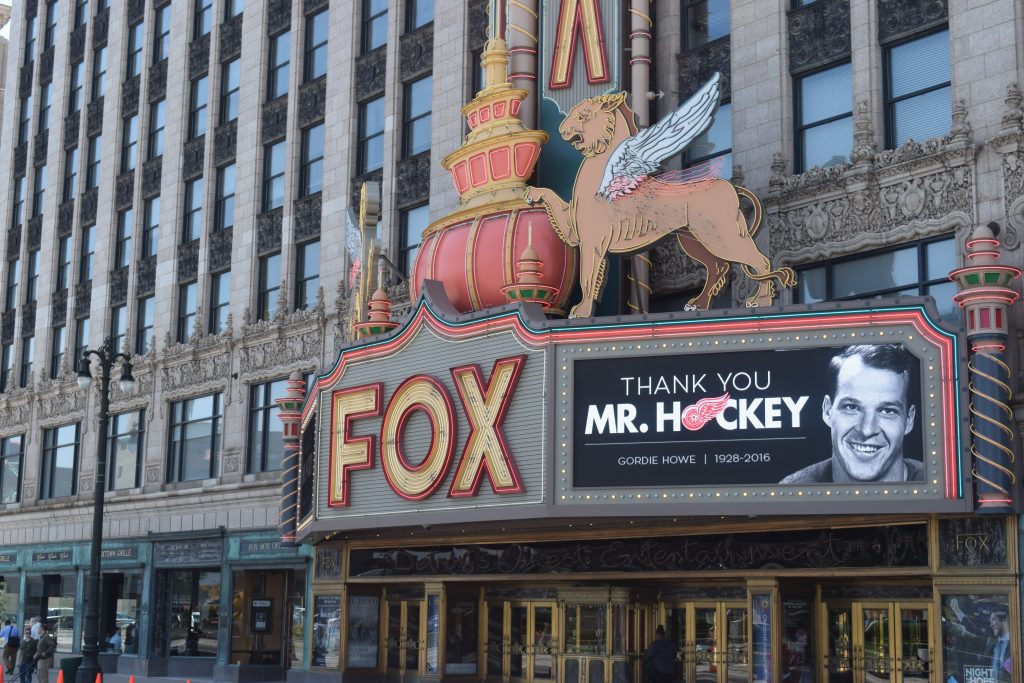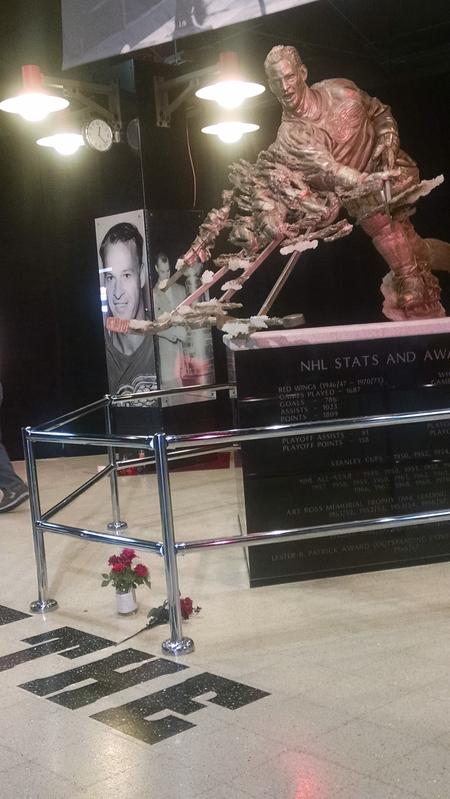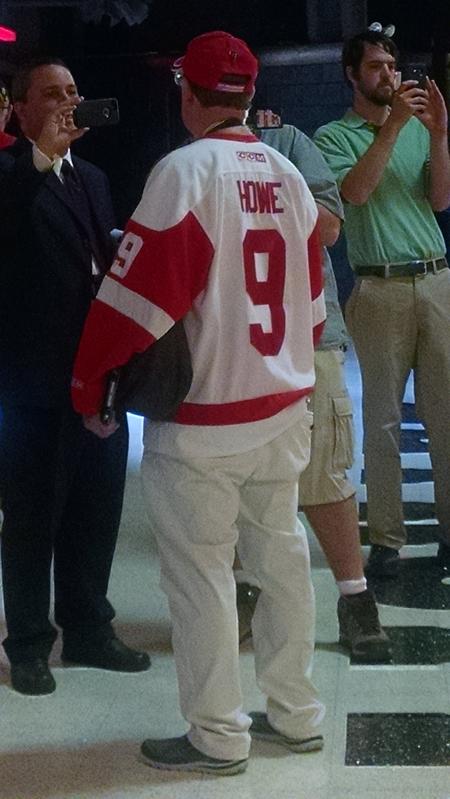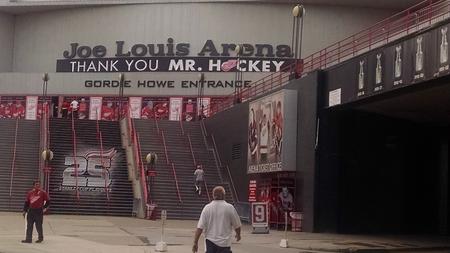The Life of Gordie Howe in His Own Voice
Hockey great Gordie Howe eulogized at Detroit funeral. In 2001 he talked about his life in never-before-heard interview


Some of the best-known in the sport of hockey, and in the halls of government, paid tribute to Gordie Howe at the funeral for “Mr. Hockey” in Detroit.
One of his sons said the hockey great wanted his epitaph to be ”Finally, the end of the third period.”
Howe finished his legendary 32-year career by playing on the same pro team with two of his sons.
He earned half-a-dozen Most Valuable Player awards and four Stanley Cup championships.
In 2001 Howe sat down with WDET’s Quinn Klinefelter for an exclusive interview about his life and time in Detroit.
Here’s an excerpt from that never-before-heard interview:
HOWE: I was with the Red Wings for 25 playing years. And a few years, the hardest years of my life, was in the front office. I didn’t like not being on the ice at all.
QK: What did you play for during the 50’s?
HOWE: What did I play for? The fun of it.
QK: No I mean what position did you play, center?
HOWE: Oh I see. No, I was gonna say, what did you play for? Not very much. Ha! No, I played right wing from the start all the way through ‘til later on in my career, and they put me back a little bit on defense. And I think when I made the move to Houston they put me in the middle.
This is not a knock on Detroit. I loved every moment here. But just the fact that when you put on the skates with the two kids, that meant everything to me. And I thought of all the years I had in Detroit, I had injuries and hurts and everything else. I thought I made the biggest mistake of my life when I came out of retirement. I hurt all over.
QK: Why did you come out of retirement then?
HOWE: Well I had an opportunity. I played 25 years in Detroit, and things weren’t… Near the latter part in the late 60’s things were going a little rough for Tigers and everybody else, the Lions, we were all having a little bit of trouble there. And when you’re hurting and your team isn’t doing well it’s not a place to be. So I had spent 25 years and my retirement was well-thought out.
And I went in the front office. And then after two years Mrs. Howe started the Junior Red Wings for Detroit. And what happened was Mark and Marty were out there. And the ability I saw in them, I knew they were potentially NHL material. And it was one way of saying thank you to Detroit anyway for everything they’d done for me too. Because nobody makes the game on their own, they have to have help. And when I came to Detroit that was the icing on the cake, because a lot of my friends had come to Detroit for camp. Had opportunity to meet Sid Abel and Ted Lindsay and we just fell together, all the pieces came together when we got on our line. Back in the 50’s they were calling us “The Production Line,” so that’s what we were known as.
QK: And you guys won, what, four Stanley Cups?
HOWE: We won four Stanley Cups, yeah. And along with that Sid, Ted and I, I think we’re the last line in hockey, in the NHL, to end up one-two-three in scoring. Which I know I’m very proud of.
QK: Why were you guys so good in the 50’s? Was it a team effort? Were you the star of it?
HOWE: No it was team. Everybody. When I started I think I had seven goals the first year. I didn’t play that much. But the opening game, it was really a surprise, because Jack Adams, he was the coach at that time, and when everybody warmed up and the whistle blew then you came over to the bench and they’d tell what the starting line-up was. And I think it was, at that time, it was Billy Taylor, Adam Brown, and he says Howe. And I almost dropped my teeth. I got a goal in my first game, I remember that very well. And then I didn’t see the ice very much. And then one night playing in Dallas, Texas, one of my buddies got in a fight and wasn’t doing too well. So I jumped over the boards and took the guy on. And Tommy Ivan said to me ‘Don’t you like him?’ And I said I don’t like anyone out there. And I never missed another shift.
In that one conversation he molded me into the player I should be – hit and be like a dogcatcher. Anything moves, run at it. Ha! I ran at everything. I fought. My first fight, the whole thing, in the first game I fought.

QK: How about the team itself? You guys won four Stanley Cups in one decade. Were you guys just that much better than everybody else?
HOWE: We had such togetherness. I attribute it to the riding on trains, which helped an awful lot. Because when we’d leave like, Montreal or New York or Boston, we were going overnight by train. We’d sit in what they called the women’s end of the car. They had a bigger room so we could get more players in there. And then we’d go over the game, the one we just played and the ones coming up. And the older players, they taught us a lot. I still think that we could’ve won a few more. And I think the fact that we didn’t have much money, we had to stick together. You couldn’t go out to the ballet or some dang thing. You had to stick within your limits.
QK: How was the city at that time? How did it treat you?
HOWE: Oh it treat us well. There’s no complaints. It’s changed considerably, you know, sometimes you’re a little concerned about walking by yourself somewhere. But in those days Ted Lindsay had a girlfriend in Windsor. So instead of I going across I’d say I’ll be on Woodward (Avenue.) You’ll find me. I’d walk Woodward for three or four miles. Back and forth. And the people would recognize you, stop and say hello, want to go give you, buy you a drink or something.
QK: What did you think after the riots? How was Detroit then?
HOWE: Well for me, I’d have people in Detroit come visit us. And I said do you want to see where the riots were? And most of ‘em would say ‘Stay out of there, that’s crazy.’ And I’d say no, it’s not crazy. I’d drive through, Linwood and down there, past all the wrecks. And people would say ‘Hey Gordie!’ They called me Mister Gordie, you know, I was Mister Gordie there. I’m very happy to say they accepted me very, very nicely.

And I don’t think now, with the big building (Joe Louis Arena) being as much as it is, they isolate the players a lot. They come out the back end and they got their own little private way out to get into their cars and they’re protected. Back in our days if you liked it you’d stand there for an hour and sign. And I liked it. I liked to meet the people that were cheering for me.
Howe was so esteemed he was given a lengthy standing ovation during his last All-Star game appearance in Detroit. Click here to see what it was like.
